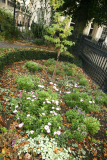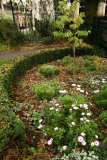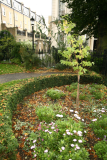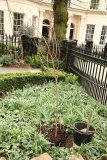Additional notes (click to expand)
Horticulture
This tree replaced the Prunus serrulata var. longipes which was removed when it was dying of Honey Fungus and old age. A chance encounter at a book launch, resulted in Jack Peppiatt and Amanda Peters donating a mulberry tree to the College. Not an ordinary mulberry, but Morus nigra ‘Chelsea’, (syn 'King James') associated with King James 1 of England whose authorised version of the Bible was published 400 years before this specimen was planted, in 1611. see 'Other Uses'
H.F. Oakeley note
Medicinal
Morus nigra makes silk (via silk worms which will eat it, although they prefer Morus alba) which is used for sutures in surgery, and it is a good source of Vitamin C for treating and preventing scurvy.
Nomenclature
Syn: Morus nigra 'King James'
Other use
This particular cultivar, Morus nigra ‘Chelsea’, (syn 'King James') is associated with King James 1 of England whose authorised version of the Bible was published 400 years before this specimen was planted, in 1611. King James was an active monarch, and a friend of the College. He published A Counterblaste to Tobacco in 1604 attacking the smoking habit (it took the College another 350 years before it produced anything similar). He decided that England should become self-sufficient in silk so, in 1608-9 he imported tens of thousands of mulberry trees, for silkworm caterpillars feed on them. Seven hundred were planted on the land where Buckingham Palace was later built, and several ere planted in the garden of Chelsea Manor, the site of the future Chelsea Physic Garden. The discovery that he had imported the wrong one, because silkworms prefer Morus alba must have been a trifle embarrassing, but the trees prospered, the fruit was delicious, and a few are still alive today.
It has delicious edible fruits which are a good source of Vitamin C.
H.F. Oakeley note
Morus nigra L. 'Chelsea'
Family: MORACEAEGenus: Morus
Species: nigra L.
Cultivar: 'Chelsea'
Common names: Black Mulberry
Pharmacopoeia Londinensis name: Mora celsi
Distribution summary: Eurasia
Habit: Tree
Hardiness: H5 - Hardy; cold winter
Garden status: Currently grown
Garden location: Mulberry Tree bed (H)
Reason for growing: Medicinal, other use
 fruit.JPG)
.JPG)
.JPG)




.JPG)
.JPG)
.JPG)